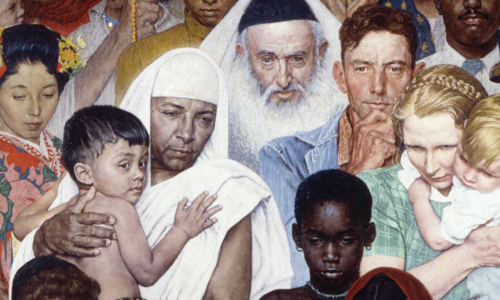The difference between the Catholic perspective on the dignity and rights of human persons and those of many secular and liberal thinkers seems to be widening. The COVID-19 pandemic and recent events have only served to make the contrast even more stark between truly Catholic health care and other visions of public health or medicine.
When at the start of the pandemic preparations were made by hospitals to face a surge of gravely ill patients that could have overwhelmed their available ventilators and ICU beds, different triage protocols were proposed. The National Catholic Bioethics Center (NCBC) and United States Conference of Catholic Bishops (USCCB), both raised the alarm about certain triage protocols and proposals that included unjust discrimination against persons based on their age or disabilities. There are sound ethical ways to determine who should get ventilator support and who should not if, for example, you face the terrible situation of 150 persons in need and only 100 available. The NCBC’s main point, and that of the Catholic Church, is that people should not be excluded a priori for utilitarian reasons that could be based on prejudice or bias rather than true medical considerations. Objective medical criteria are the best and only truly ethical way to determine in extreme situations exactly who should receive the most scarce medical resources. We thank the Lord that, as it turned out, these sorts of agonizing decisions did not have to be made often during this pandemic.
I think it is important to repeat forcefully that in our vision of bioethics all human lives matter and deserve protection. Shamefully, entire categories of human beings may be killed legally in the United States, and some liberal bioethicists fully support these violations of the human right to life. Most of these unjust legal permissions were imposed by the United States Supreme Court. Huge numbers of preborn children are aborted legally in the US. Human embryos are killed and experimented upon with very few legal protections afforded to them. Those who are at the end of life and desperate are being offered euthanasia or assisted suicide in Canada and assisted suicide in several US states rather than truly compassionate care. This was part of what led Saint John Paul II to coin the striking phrase, the culture of death.
There is a tremendous need to bring light into this darkness. Where people are tempted to solve their problems by terminating a human life, hope and help must be offered. The role of a good Catholic bioethicist is to assist professionals and patients to make good compassionate choices and not death-dealing ones. I do not think it is too dramatic to say that a battle is raging for the soul of our nation. Are we going to be a society that cherishes and protects our most vulnerable brothers and sisters or one that promotes the killing of them?
I am left with the strong impression that a real moral awakening and discernment is needed. People should take note of the major differences between truly Catholic health care and what is included under the misleading rubric of “health care” in many secular contexts.
Unfortunately, entire new categories of procedures relating to gender are now joining the list of bad practices like contraception, sterilization, abortion, etc., that are common in many institutions and should not take place in Catholic health care. My sister who is a religious living in Texas has worked for many years with patients at the end of life and has many heartbreaking stories of patients who fell victim to a culture of death mentality even though assisted suicide and euthanasia are not even legal there.
We have to treat not only the body but also the soul. I was denied access to a priest in a secular hospital because of draconian COVID pandemic restrictions when I was gravely ill earlier this summer and wrote about the experience.
It was made very clear to me that I would not get the same care in this private hospital as I would have had in a Catholic health care ministry. I do not doubt that both my wife’s and my requests for a priest to come and see me would not have been denied in a Catholic hospital. It would have made such a difference to my wellbeing to receive the sacraments of anointing of the sick and confession while still in the hospital, rather than having to wait until after my release.
The basic insight of the Catholic Church is that death-dealing can never be health care. This should be attractive, even to nonbelievers. Would you rather be in an institution where the administration and staff are committed to healing patients and never despairing and abandoning them, or in one that condones and participates in the taking of human lives at its earliest stages or at its end? It is my firm belief that this holistic approach, which respects the dignity of every human being, is certainly preferable to picking and choosing what categories of people should be protected.
Joseph Meaney is President of the National Catholic Bioethics Center.
Originally published here.
